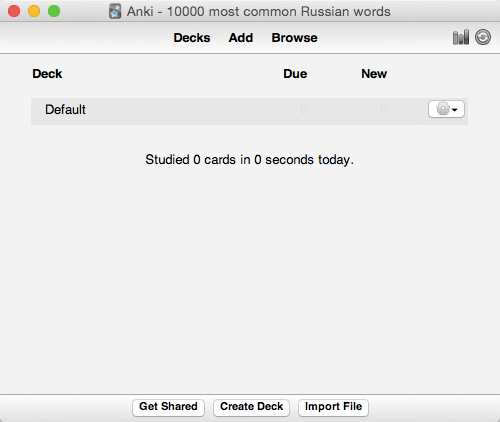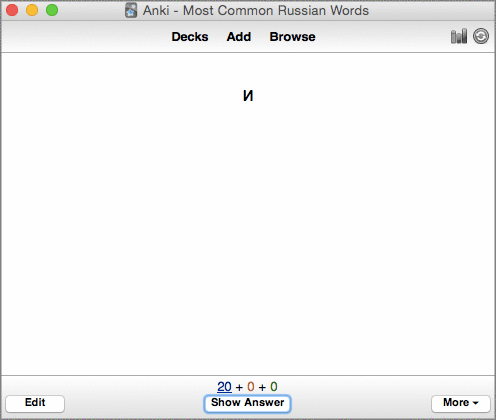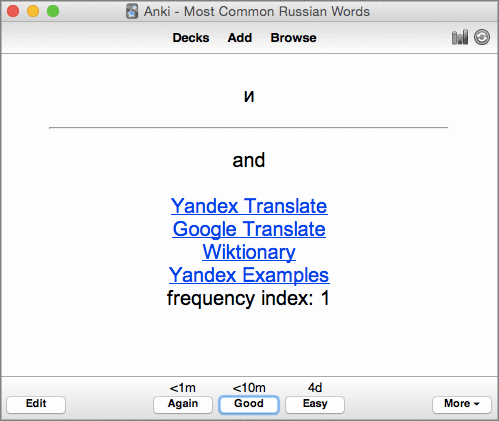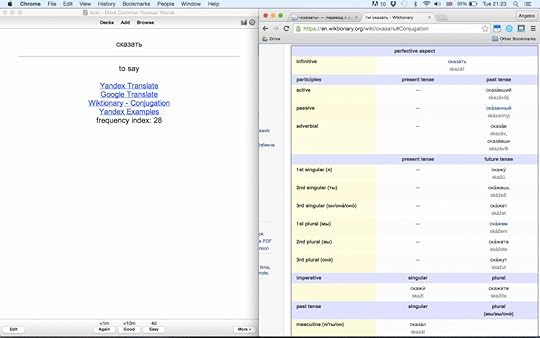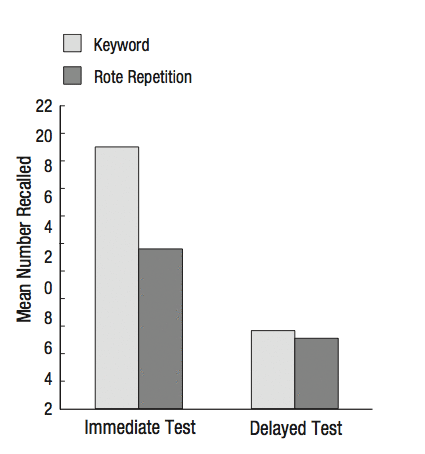Angelos Georgakis's Blog, page 5
June 10, 2016
Learn the Instrumental Case through one Film
In this article series we are exploring examples/uses of the Grammar Cases all through one film: The Irony of Fate, or Enjoy Your Bath! – Ирония судьбы, или С лёгким паром! We’re done with Genitive, Dative and Accusative Case. Today we’re gonna study the Instrumental Case.
The Instrumental Case is used to indicate a state of being, the means by which something is done, and is also used with certain verbs and prepositions.
No more bluff! You know what to do! Let’s watch the video first!
Instrumental Case in the Irony of Fate – The Video
All Examples + Additional Notes
Preposition C – “with”
Я хочу встречать Новый Год с тобой. – I want to see in the New Year with you.
ты → тобой
Подожди, как “никого”? А мама как? Мама с нами будет встречать? – Hold on, what “noone”? And mom? Is mom going to see in the New Year with us?
мы → нами
Женька, я не хочу в монастырь. Я хочу быть с тобой. – I don’t want (to go) to the monastery. I want to be with you.
Со мной? – With me?
ты → тобой
я → мной
Ну, а теперь расскажи, как ты с ней познакомился? – Tell us, how did you meet her?
она → ней
По-моему, это наш самолёт. – I think this is our plane.
Я с тобой согласен. – I agree with you.
тебя → тобой
Каждый год 31 декабря мы с друзьями ходим в баню. – Every year on the December 31st, we go to the bathhouse with my friends.
друзья → друзьями
Понимаешь, мы с ребятами, с друзьями ходим в баню. – You understand, we go with the guys, with the friends to the bathhouse.
ребята → ребятами
друзья → друзьями
Пойду варить кофе с удовольствием. – I will go to make coffee (boil coffee) with pleasure.
удовольствие → удовольствием
Instrumental Case with the Verb “быть – to be”
В самом деле, будьте вы мужчиной! – After all, behave like a man!
мужчина → мужчиной
Надя, я счастлив. – Nadya, I’m happy.
Разве можно быть таким настырным! – How can one be so obtrusive!
настырный – extremely insistive/annoying.
Но кто-то из двоих же должен быть сообразительным? – But one of the two has to be smart/astute.
сообразительный → сообразительным
Instrumental Case with the Preposition за – “behind”, “for”
Улица Строителей вот за теми высокими домами. – It’s over there, behind those tall buildings.
те высокие дома → теми высокими домами
Там за углом 30-й автобус останавливается. – There behind the corner the bus number 30 stops.
угол → углом
Мама! Кто там пришел? – Mum, who’s just come there?
Соседка пришла за луковицей. – Just a neighbour who came to get an onion.
луковица → луковицей
Instrumental Case with the verb Стать – to become
Хочу, чтоб ты стала моей женой. – I want that you become my wife.
моя жена → моей женой
Certain Wishes require Instrumental Case
И потом, доброе пожелание “с лёгким паром” в ванной! – And then, the nice wish “Enjoy your bath” in the bathroom.
лёкгий пар (light steam) → лёгким паром
С наступающим (Новым Годом). – Happy New Year.
И вас так же. – To you too.
наступающий Новый Год → наступающим Новым Годом
Use Instrumental Case to denote a Means/Instrument by a which an action is done
Извините, я постеснялся открыть своим ключом. – I’m sorry, I wasn’t comfortable to open with my own key.
ключ → ключом
Вы не могли бы мне одолжить рублей 15-16? – Could I borrow 15-16 Rubles from you?
Я вам завтра же вышлю. – I’ll send them to you tomorrow.
Телеграфом вышлю. – With wire transfer.
Телеграф → Телеграфом
Нет, тогда уезжай поездом. – No, then go away by train.
поезд → поездом
Instrumental Case with the Preposition Перед – “in front of”
Я не собираюсь перед вами отчитываться. – I’m not going to report in front of you.
вы → вами
Но я же вечно буду мелькать у тебя перед глазами. – But I will always be flashing before your eyes.
глаза → глазами
Мы поехали на аэродром провожать Павлика. – We went to the airport to see off Pavel.
Перед этим мы мылись. – Before that, we washed ourselves.
это → этим
Перед этим is a set phrase which means before that (до этого).
Instrumental Case with the Preposition Между – “between”
Хорошо, я ему ничего не сделаю, только засуну между книгами. – I won’t do anything to him, I’ll just put him away between books.
книги → книгами
Мне 36 лет, между прочим… – I’m 36, by the way…
Note: между прочим – the most literal translation is “among other things” (между can mean not only “between” but also “among”). Here the meaning is: “it’s not the only reason, there are many others, but my age also matters”.
Instrumental Case with the Preposition Над – “over, upon”
До какой нелепости доходили наши предки. – To what lengths of absurdity our ancestors went to…
Они мучились над каждым архитектурным проектом. – They suffered/struggled upon every architectural project.
каждый архитектурный проект → каждым архитектурным проектом
Instrumental Case with the Preposition Под – “under”
Мне нравится, что вы больны не мной, – I like that you are not head over heels in love with me
Мне нравится, что я больна не вами, – I like that I’m not head over heels in love with you
что никогда тяжелый шар земной – I like that the heavy globe of the Earth
не уплывет под нашими ногами. – will never slide from under our feet.
я → мной
вы → вамн
наши ноги → нашими ногами
Lets Test Ourselves
As always, I’ve written again all the above examples in an exercise form so you can test yourself not only once but multiple times spread in time! That’s the key to effective learning!
Don’t worry about forgetting things! This is normal in the learning process! Just put as much effort as possible to remember. That will prevent you from forgetting again! Удачи!
Examples
Подожди, как “никого”? А мама? С …… (мы) будет встречать?
Извините, я постеснялся открыть …… (свой ключ).
Перед …… (это) мы мылись.
Мы с …… (ребята) 31 декабря ходим в баню.
Разве можно быть …… (такой настырный)!
Каждый год 31 декабря мы с …… (друзья) ходим в баню.
Мне нравится, что вы больны не …… (я), мне нравится, что я больна не …… (вы), что никогда тяжелый
шар земной не уплывет под …… (наши ноги).
Расскажи, как ты с …… (она) познакомился?
Но я же вечно буду мелькать у тебя перед …… (глаза).
Я с …… (ты) согласен.
Я вам завтра же вышлю. …… (телеграф) вышлю.
Они мучились над …… (каждый архитектурный проект).
Пойду варить кофе с …… (удовольствие).
Хочу, чтоб ты стала …… (моя жена).
С …… (наступающий Новый Год).
В самом деле, будьте вы …… (мужчина)!
И потом, пожелание “с …… (лёгкий пар)” в ванной!
Но кто-то же должен быть …… (сообразительный)?
Я не собираюсь перед …… (вы) отчитываться.
Соседка пришла за …… (луковица).
Я не хочу в монастырь. Я хочу быть с …… (ты). – Со …… (я)?
Нет, тогда уезжай …… (поезд).
Там за …… (угол) 30-й автобус останавливается.
Я ему ничего не сделаю, только засуну между …… (книги).
Улица Строителей вон за …… (те высокие дома).
Мне 36 лет, между …… (прочим)…
Я хочу встречать Новый Год с …… (ты).
The post Learn the Instrumental Case through one Film appeared first on Explore Russian.
June 2, 2016
Свой – The Reflexive Possessive Pronoun
The pronoun свой was for me one of those things that I’ve always tried to stay away from.
I could sense it was one of those tricky bits in the Russian grammar.
Also, since I could use мой to say my, I always thought that свой was something I could live without.
Ну, ладно… “I’ll look at that свой one day”, I kept telling myself.
We, language learners, tend to procrastinate when it comes to nailing down “grey areas” in a language.
However, just like we should never miss an opportunity to practice with native speakers, we should also try to attack those grey areas that create discomfort in the back of our heads.
I finally took the brave decision to throw some light on свой!
If you have you also ignored it, I think it’s time we gave it some attention.
In the end, you’ll see it’s not that bad.
Why do we need свой?
Let’s say you have two friends, Masha and Elena. Consider the following sentence in English:
Masha loves her dog.
Who does her refer to? It could be that Masha loves her own dog, or her friend’s dog (Elena’s dog).
This ambiguity is solved in Russian with the use of the pronoun свой (masculine) – своя (feminine) – своё (neuter) – свои (plural) which means one’s own.
So, two different cases:
Маша любит свою собаку. – Masha loves her (own) dog.
Маша любит её собаку. – Masha loves her (Elena’s) dog.
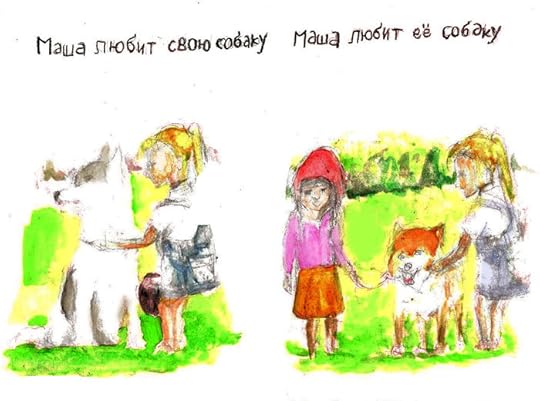
The pronoun свой declines just like the pronoun мой and твой (look further down for the declension table).
As I said earlier, every time I wanted to say my, I used мой. For example,
Я люблю мой (свой) город. – I love my city; (both мой and свой are OK here)
So, in sentences in which you talk about yourself you could get away with using свой.
However, there is no way you can avoid свой if you want to say that Masha loves her own dog!
When is свой necessary and when not?
Let’s look now at all the cases one by one where we must use свой.
When the subject of the sentence is я, мы, вы, it’s not necessary to use свой; it could be replaced by мой, наш, and ваш respectively. For example,
Я забыл мой (свой) зонтик. – I forgot my umbrella.
Мы любим наш (свой) город. – We love our city.
Вы забыли ваш (свой) ключ. – You forgot your key.
When the subject is ты you can still use твой but свой is preferable.
Ты не видела свою собаку. – You didn’t see your dog.
As discussed above, when the subject is in the 3rd person (either singular or plural), the use of свой is obligatory.
Compare the following two pairs:
Мария ремонтирует свою машину. – Maria is fixing her own car.
Мария ремонтирует её машину. – Maria is fixing her car (someone else’s car – obviously female because of её).
Они любят свою собаку. – They love their (own) dog.
Они любят их собаку. – They love their dog (it could be their friends’ dog).
Attention: Although you can use мой, наш, and ваш in all the above cases, свой is still more preferable and sounds more natural to a native speaker!
Свой and the subject must be in the same clause
As you have noted, свой refers always to the subject of the sentence.
Я потерял свои деньги. – I lost my money.
Мы любим наш (свой) город. – We love our city.
Она ремонтирует свою машину. – She is fixing her own car.
Now pay attention to the following example:
Он говорит, что его сестра живет в Англии. – He says that his sister lives in England.
In the above example, we have him and his own sister. However, we can’t use свой as the subject he and his sister are not in the same clause.
He is part of the main clause (Он говорит…) and his sister is part of a subordinate clause (… что его сестра живет в Англии).
Свой doesn’t like multiple subjects
When we have a multiple subject, свой is not allowed.
When I say multiple I mean multiple nouns serving as a combined subject. For example,
Он и его сестра живут в Англии. – He and his sister live in England.
So, although it’s him and his sister again, we can’t use он и cвоя сестра in the above example.
More examples:
Он и его друг поехали в деревню. – He and his friend went to the village.
Оля и её сестра живут в Москве. – Olya and his sister live in Moscow.
Sometimes we don’t have to use any possessive pronouns
In Russian, when there is no ambiguity, we can omit a pronoun completely. For example,
Она любит мать. – She loves (her) mom. (It’s obvious; it’s her own mom whom she loves.)
Она порвала платье. – She tore her dress.
Она продала квартиру. – She sold her apartment.
It is also common to drop the pronoun when we refer to parts of the body. For example,
Она сломала ногу. – She broke (her) leg.
Он поднял руки. – He raised (his) hands.
Use свой in impersonal phrases
In impersonal phrases (in which the object isn’t specific) we use свой to express possession. For example,
Важно знать свои корни. – It’s important for one to know one’s roots.
Надо уважать своих родителей. – One has to respect one’s parents.
You see that I did my best to express the impersonal meaning of the phrases using one and one’s. In English, you could also say It’s important to know your roots if you wanted to make an impersonal statement. However, if you saw that phrase standing on its own, you wouldn’t be certain whether just YOU should know your roots or lots of people in general.
Свой in the Nominative Case
As you have realised, we don’t often see свой in the Nominative Case. However, in certain Russian proverbs and idiomatic phrases that’s possible. For example,
Свой свояка видит издалека. – Birds of a feather flock together.
Свой дурак дороже чужого умника. – Blood is thicker than water.
Своя рубашка ближе к телу. – Charity begins at home.
У нас нет от неё секретов: она здесь своя. – We don’t keep any secrets from her; she is one of us.
Не стесняйся, здесь все свои. – Don’t be shy; Everyone here is familiar/friend.
У него есть свой бизнес. – He has his own business (Another way to say the same thing is У него есть своё дело).
Свой – Declension Table
Case
Singular
Plural
masculine
feminine
neuter
Nominative
свой
своя́
своё
свои́
Genitive
своего́
свое́й
своего́
свои́х
Dative
своему́
свое́й
своему́
свои́м
Accusative (animate)
своего́
свою́
своё
свои́х
Accusative (inanimate)
свой
свою́
своё
свои́
Instrumental
свои́м
свое́й
свои́м
свои́ми
Prepositional
своём
свое́й
своём
свои́х
Свой – Exercise
Now’s it’s time to test ourselves. Don’t even think to skip the test! It’s the most important part of this lesson and every lesson.
I have mentioned the importance of testing and recall practice a million times in previous articles. You can also watch my YouTube video explaining that in three minutes.
In the examples below, I want you to insert свой, or if this is impossible, a suitable possessive pronoun.
У Даши один брат и одна сестра. – Dasha has one brother and one sister. Она часто говорит о ……… брате и о ………  сестре. – She often speaks about her brother and her sister. ……… брат и сестра живут далеко от Даши. – Her brother and her sister live far from her.
Петя пошёл в гости к ……… другу. ……… друг живёт в центре. – Petya visited his friend. His friend lives in the centre.
Мой брат и ……… (his) друг обедают. – My brother and his friend are having lunch.
Она сказала, что ……… брат болен. – She said her brother was ill.
Вы нашли ……… карточку? – Did you find your card?
Они потеряли ……… книги. – They lost their books.
Это не ……… книга. Возьми ……… – This is not your book. Get yours.
Я порезал ……… палец. – I cut my finger.
Мы красили ……… комнату. – We painted our room.
У бабушки очень хорошая соседка. Бабушка очень часто ходит к ……… соседке. – Grandma has a very nice neighbour. She visits her neighbour very often.
Очень важно знать историю ……… страны. – It’s very important to know the history of your country.
Лена недавно ездила в Париж. Она рассказала всем о ……… поездке. – Lena recently went to Paris. She talked to everyone about her trip.
Света любит ……… девочку. Она думает, что ……… девочка очень умная и красивая. – Sveta loves her girl (daughter). She thinks that her girl is very clever and beautiful.
Коля сказал, что ……… друг потерял ……… книгу. – Kolya said that his friend lost his (own) book.
Коля сказал, что ……… друг потерял ……… книгу. – Kolya said that his friend lost his (Kolya’s) book.
Она звонила ……… другу. – She called her friend.
Она вытирает ……… руки. – She is drying her hands.
Мы идём к ……… друзьям. – We’re going to our friends.
Ольга не знает, что ……… муж рассказывает о ……… жизни. – Olga doesn’t know that her husband is talking about his life.
Ты получила письмо от …….. мужа? – Did you get a letter from your husband?
Answers to the Exercise
своём, своей, no pronoun here (it’s obvious that she’s talking about her brother and her sister). Also, in the place of “Она часто говорит о своём брате и о своей сестре” you can just say “Она говорит о своих брате и сестре.“
своему, его
его
её
свою
свои
твоя, свою
– (no pronoun is necessary)
свою (or нашу)
своей
своей
своей
свою, её
его, свою
его, его
своему
– (no pronoun is necessary)
своим
её, своей
своего
You didn’t skip the exercise, did you? 
May 23, 2016
Learn the Russian Cases through one Film – Part 3 (Accusative Case)
Part 3 and time to explore the Accusative Case!
For new readers, in this article series we are exploring the Grammar Cases through examples taken from the famous film The Irony of Fate, or Enjoy Your Bath! – Ирония судьбы, или С лёгким паром!
In the previous articles we looked into uses of the Genitive and Dative Case.
Off we go and let’s watch the video first! After that, you can study all the examples below and also perform a self-check with the exercise in the end.

Uses of the Accusative Case – The Video
Uses of the Accusative Case – All Examples and Additional Notes
Direct Object
The Accusative case is mainly used as the direct object of transitive verbs (those that pass an action to an object) such as “to read” , “to see”, “to write”, etc.
А я так люблю крабы! – I so much love crabs.
крабы → крабы (crabs are not a person – Accusative same as Nominative)
Там увидите церковь. – There you’ll see the church.
Спасибо. – Thanks
церковь → церковь (church is not a person – Accusative same as Nominative)
Слушай, а как её зовут? – Listen, and what’s her name?
она – её
Мне бы хотелось узнать одну маленькую деталь. – I’d like to know one small detail.
одна маленькая деталь → одну маленькую деталь
Feminine nouns ending in -ь don’t change in the Accusative Case.
А жизнь нельзя подогнать под выверенную схему. – But you can’t fit life into a perfect scheme.
жизнь → жизнь (A feminine noun ending -ь doesn’t change in the Accusative Case)
Ты посмотри на него. – You look at him.
Я еще успею. – I still have time.
смотреть на кого-то – to look at someone
Note: The Accusative Case of он can be either его, or него if it follows a preposition like in our case (на).
Я тоже не знаю, как его зовут. – I don’t know what’s his name.
Я его первый раз в жизни вижу! – I see him for the first time.
он → его
Я пью только чай, кофе, ну там, кефир разный, напиток байкал, воду…
чай → чай
кофе → кофе
кефир разный → кефир разный
напиток байкал → напиток байкал
Note: You see above that Inanimate Masculine nouns don’t change in the Accusative Case.
вода → воду
Note: Напиток Байкал is an extract of various aromatic herbs. It’s dark brown and some people jokingly call it “Soviet cola”.
Что вы ему сказали? – What did you say to him?
Правду. – The truth.
правда → правду
сказать кому-то что-то – say something (DO) to someone
Как встретишь Новый Год, так его и проведёшь. – You will live through the new year the same way you see it in.
Новый Год → Новый Год
он → его
To Express Motion
The Accusative Case is used with the prepositions в, на, за, под to indicate motion. It’s not used when the destination is a person or a person’s home.
Простите, вы не скажете, как мне пройти на 3-ю улицу Строителей? – Excuse me, how can I get to the 3rd Constructors Street?
третья улица → третую улицу
Иди в баню. – Go to the bathhouse (metaphorically this is something like “Get out of here/Get lost”)
баня → баню
Note: Some say that this phrase has its origin in the film. However, there is an ethnographic explanation as well. The bath used to be considered the refuge of the evil spirit. That’s why in the bath no holy icons are allowed. So, to send someone to the bath is sort of a curse.
Все! Нам нужно на аэродром. – That’s enough! We need to get to the airport.
аэродром → аэродром
Зачем? – What for?
Кто-то из нас летит в Ленинград. – Someone is flying to Leningrad.
Ленинград → Ленинград
Мы не будем полагаться на случай. – Let’s not give ourselves into the hands of chance.
случай → случай
На меня что-то упало! – Something fell on me.
я → меня
Common Verbs Expressing Relationships between People Require Accusative Case
Да, я тоже очень тебя ждала. – I’ve also been waiting for you.
ты → тебя
ждать (жду – imperfective) кого-то – to wait for someone
Ну, как это говорится?.. – Well, how to say this?
Я люблю тебя. – I love you.
ты → тебя
любить (люблю – imperfective) кого-то – to love someone
Если вы любите женщину, вы должны доверять ей. – If you love a woman, you have to trust her.
женщина → женщину
Теперь она найдёт настоящего человека. – Now she will find a true person.
настоящий человек → настоящего человека
-Я прихожу, а тут… – I come here and (all this happens)…
-Я тебя понимаю. – I understand you.
ты → тебя
понимать (понимаю – imperfective) кого-то – to understand someone
Я вас ненавижу, вы мне сломали жизнь. – I hate you. You ruined my life.
вы → вас
ненавидеть кого-то – to hate someone
сломать (сломаю – perfective) что-то – break, ruin something
Мы провожали Павлика, а сейчас я иду домой. – We saw off Pavel, and now I’m going home.
Павлик → Павлнка
проводить кого-то – to see off someone
Preposition За
Ребята, давайте выпьем за нашу дружбу! – Guys, let’s drink to our friendship!
наша дружба → нашу дружбу
пить за что-то – to drink to something
Мы в бане выпили. – We drank in the bathhouse.
За невесту мою, потом за меня. – To my wife, to me.
моя невеста → мою невесту
я → меня
пить (пью – imperfective) за что-то/кого-то – to drink to something/someone
Спасибо за доверие. – Thanks for trusting me.
доверие → доверие (Neuter nouns don’t change in the Accusative Case)
Спасибо кому-то за что-то – Thanks to someone for something.
Preposition Про – “about”
А что вы хотите, чтоб я им рассказала про вашу баню? – And what do you want me to do? To tell them the story about the bathhouse?
ваша баня → вашу баню
Про московскую невесту он забывает, естественно. – He forgets about his Moscow fiancee, naturally.
московская невеста → московскую невесту
Когда делают предложение одной женщине, то не вспоминают про другую. – When a man proposes to a woman, he doesn’t talk about another.
другая (женщина) → другую (женщину)
Time Expressions with the Prepositions на, за, через
The Accusative Case is used with the prepositions на, за, через, in time expressions.
Не цепляйся к словам. – Don’t pick on words.
Можно тебя на минуту? – Can I talk to you for a minute?
минута → минуту
Note: Here a verb like позвать, отозвать (в сторону), or отвлечь is implied here and тебя is the object. It’s like “Can I have you/talk to you for a minute?”
Но ведь самолёты ходят через каждые полчаса. – But planes leave every half an hour.
полчаса → полчаса
В конце концов, с вами произойдёт то же самое, в самый последний момент он вас бросит. – In the end at the last moment it will happen the same with you; he’ll dump you too.
самый последний момент → самый последний момент (Inanimate masculine nouns don’t change in the Accusative Case)
А сейчас вы с Павлом большие друзья? – And now are you friends with Pavel?
Почему “сейчас”? Мы всю жизнь с ним друзья. – We have been friends all our life.
вся жизнь → всю жизнь
У меня такое ощущение, что за эту ночь мы прожили целую жизнь. – I have a feeling, that in one night we lived a whole life.
эта ночь → эту ночь
целая жизнь → целую жизнь
Certain Verbs take Accusative Case
Почему вы на меня кричите? – Why are you shouting at me?
я → меня
кричать (кричу – imperfective) на кого-то – to shout at someone
Паша, положись на меня, я никогда не пьянею. – Pavel, count on me, I never get drunk.
я → меня
положиться (положусь – perfective) на кого-то – to lean on someone/ rely on someone
Note: We saw earlier the imperfective form полагаться (Не будем полагаться на случай). After будем we can only have the imperfective form of the verb.
А на правду нельзя обижаться, если она даже горькая. – One can’t be offended at the truth, even if it’s the bitter truth.
правда → правду
обижаться на что-то / кого-то – to take offence at something / someone
Let’s test Ourselves
I’ve said it many times. I’ll say it again.
Testing or recall practice is very important if we want to remember something in the long-run.
Even if you went through and perfectly understood all the examples above, that doesn’t mean that you’ll be in a position to remember them next week or even after a couple of days.
Research has shown that we are very poor judges of future performance in learning (how well we’ll remember something in the future) based on current performance (how well we remember something now).
After months of research in cognitive psychology (the science of memory and learning), I wrote a book (The Superlearner Myth) about how to learn effectively and also made a few videos on YouTube. I’m sure these resources will help you not only with Russian but anything you’re trying to learn.
So, after you finish studying the above examples complete the below exercise. Redo the exercise on the next day or over the weekend. It’s not only about recall practice. It’s about repeated recall practice. That’s the key to effective learning.
Examples
Но ведь самолёты ходят через каждые …… (полчаса).
А на …… (правда) нельзя обижаться, даже если она горькая.
В конце концов, в …… (последний момент) он вас тоже бросит.
Как встретишь …… (Новый Год), так …… (он) и проведёшь.
На …… (я) что-то упало!
А что вы хотите, чтоб я рассказала им про …… (баня)?
Про …… (московская невеста) он забывает, естественно.
Мы провожали …… (Павлик), а сейчас я иду домой.
Все! Нам нужно на …… (аэродром).
А …… (жизнь) нельзя подогнать под выгодную схему.
Теперь она найдёт …… (настоящий человек).
Спасибо за …… (доверие).
Ты посмотри на …… (он).
Мы не будем полагаться на …… (случай).
Почему вы на …… (я) кричите?
Мне бы хотелось узнать …… (одна маленькая деталь).
Я тоже не знаю, как …… (он) зовут.
Паша, положись на …… (я), я никогда не пьянею.
Когда делают предложение одной женщине, то не вспоминают про …… (другая).
Я …… (вы) ненавижу, вы мне сломали …… (жизнь).
А я так люблю …… (крабы)!
Слушай, а как …… (она) зовут?
Кто-то летит в …… (Ленинград).
Что вы ему сказали? – …… (правда).
Простите, как мне пройти на …… (третья улица) Строителей?
Если вы любите …… (женщина), вы должны доверять ей.
Я …… (он) первый раз вижу!
Мы …… (вся жизнь) друзья.
Можно тебя на …… (минута)?
У меня такое ощущение, что за …… (эта ночь) мы прожили …… (целая жизнь).
Я пью …… (чай), …… (кофе), ну там, …… (кефир), …… (напитки разные), …… (вода)…
Иди в …… (баня).
Я тоже очень …… (ты) ждала.
– Я …… (ты) понимаю.
Мы в бане выпили. За …… (невеста моя), за …… (я).
Я люблю …… (ты).
Ребята, давайте выпьем за …… (наша дружба)!
Там увидите …… (церковь).
The post Learn the Russian Cases through one Film – Part 3 (Accusative Case) appeared first on Explore Russian.
April 30, 2016
Learn the Russian Cases through one Film – Part 2 (Dative Case)
Hey guys! How did you find the Genitive Case from Part 1? I hope you learned lots of new things. This time I went carefully through the film and put together lots of examples with the Dative Case for you.
For those who haven’t read the first Part, in this article series we are studying the uses of the Grammar Cases through examples taken from the popular Russian film The Irony of Fate, or Enjoy Your Bath! – Ирония судьбы, или С лёгким паром!
The Dative Case (дательный падеж) is used mainly as the Indirect Object in a sentence, in impersonal constructions and after certain verbs and prepositions.
If you haven’t watched the film I suggest that do it so you remember the context of each of the examples below. You can watch the film with English subtitles here (1st Part, 2nd Part).
Once you’re familiar with the film you can watch the video I made below focusing only phrases with the Dative Case and study the examples.

Uses of the Dative Case – The Video
Uses of the Dative Case – All Examples and Additional Notes
Dative Case for Indirect Objects
In the following examples, the Indirect Object is in Dative Case whereas the Direct Object is in the Accusative.
И наконец, тебе скажу всё, что я должен сказать. – And I’ll finally tell you everything I have to tell you.
ты → тебе
сказать (скажу – perfective) кому-то что-то – say something (Direct Object: DO) to someone (Indirect Object: IO)
Неужели ты сделаешь мне предложение? – Could it be that you’ll propose to me?
я → мне
делать предложение кому-то – to make a proposal (DO) to someone (IO)
Дай, Джим, на счастье лапу мне. Давай. – Jim, give me your paw for happiness. – Come on!
я → мне
Знаешь, я же делал уже предложение одной женщине. – You know, I already proposed to a woman once.
одна женщина → одной женщине
Когда делают предложение одной женщине, то не вспоминают про другую. – When a man proposes to a woman, he doesn’t talk about another.
одна женщина → одной женщине
До вечера. Маме привет передавай. – See you in the evening. Say hello to mum.
мама → маме
передавать (передаю – imperfective) кому-то привет – to say hello (DO) to someone (IO)
Зачем ты говорил ей про Ленинград? – Why did you tell her about Leningrad?
она → ей
говорить (говорю – imperfective) кому-то про что-то – to talk to someone (IO) about something
Эта песня про любовь. – This is a love song. (The preposition про takes Accusative Case)
– Ты мне говоришь? – Are you talking to me?
– Тебе. – To you.
я → мне
ты → тебе
говорить (говорю – imperfective) кому-то – to talk to someone (IO)
Я вам паспорт покажу. – Ι will show you the passport.
Пьяница! – You drunk!
вы → вам
показать (покажу – perfective) кому-то что-то – to show something (DO) to someone (IO)
Я приготовил тебе мой новогодний подарок. – I prepared a New Year present for you.
Спасибо. Я тоже приготовила тебе подарок. – Thanks, I have a present for you too.
ты → тебе
приготовить (приготовлю – perfective) кому-то подарок – to get someone (IO) a present (DO)
Я сейчас оденусь и все вам подробно объясню. – Now I’ll get dressed and explain everything to you in detail.
вы → вам
объяснить (обьясню – perfective) кому-то что-то – to explain something (DO) to someone
У меня ключ подошел. – My key fit (the door).
Значит, ты дала ему ключ? – So, you gave him the key?
он → ему
дать (дам – imperfective) кому-то что-то – to give someone (IO) something (DO)
Ради Бога, не волнуйтесь, успокойтесь, я вам все сейчас объясню. – For God’s sake, calm down. I will now explain everything to you.
вы → вам
Я тебе повторяю. – I repeat to you.
Не надо мне повторять! – You don’t have to repeat it to me.
ты → тебе
я → мне
повторять (повторяю – imperfective) кому-то что-то – to repeat something (DO) to someone (IO)
Это бестактно с твоей стороны напоминать мне о моём возрасте. – It’s tactless from your side to remind me of my age.
я → мне
напоминать (напоминаю – imperfective) кому-то о чём-то – to remind someone (IO) about something
Preposition K – “towards”
К моему великому изумлению, она согласилась. – To my utter amazement
she said “yes”.
мое великое изумление → моему великому изумлению
У нас много тут подарков, приходите к нам, друзья. – We have lots of presents here, come to us friends!
мы → нам
Женечка, у меня к тебе предложение самое неожиданное. – Zhenya, I have the most unexpected proposal for you.
ты → тебе
К черту Олега! – To hell with Oleg.
К черту монастырь! – To hell with the monastery.
черт → черту
Ребята, давайте завтра. – Guys, come on, tomorrow!
Приходите ко мне завтра. – Come to visit me tomorrow.
я → мне
приходить (прихожу – imperfective) ко кому-то – to visit someone
Заходи в гости ко мне , квартира 12 у меня. – Come visit me. It’s apartment 12.
я → мне
заходить (захожу – imperfective) ко кому-то в гости – to visit someone
Просто ты ко мне необъективно относишься. – It’s just that you are not impartial towards me.
Еще как! – You bet.
я → мне
Certain Verbs require the Dative Case
Больно! – It’s painful!
Вставайте сейчас же! – Get up this very minute!
Ты мешаешь мне спать! – You are not letting me sleep.
я → мне
мешать (мешаю – imperfective) кому-то делать что-то – to disturb/obstruct someone from doing something
Позвоните ей. – Call her.
Как я могу, у меня талончика нет. – How can I? I don’t have a telephone card.
она → ей
позвонить (позвоню – imperfective) кому-то – to call someone
Помогите мне, пожалуйста, подняться. – Help me please to stand up.
я → мне
помогать (помогаю – imperfective) кому-то делать что-то – Help someone to do something.
Хотите, я вам помогу? – Do you want me to help you?
Нет, не хочу. – No, I don’t.
вы → вам
Так, значит, я так понимаю, Галя тебе не нравится. – I take it that you don’t like Galya.
ты → тебе
Мне что-то нравится – I like something.
Почему ты мне не веришь? – Why you don’t believe me?
я → мне
верить (верю – imperfective) кому-то – to believe someone
Галя, я должна вам сказать, что я вам немножко завидую. – Galya, I have to say that I’m a little bit jealous of you.
вы → вам
завидовать (завидую – imperfective) кому-то – to envy someone, to be jealous of someone
То, что он появился в твоем доме – это вполне соответствует твоему характеру. – His appearance in your house is typical of your character.
твой характер → твоему характеру
Preposition По
А где, по-вашему, живу я? – And where do you think I live?
Этого я не знаю. – I don’t know that.
Note: Here, the one word по-вашему is an adverb. However, we often see the expression по моему мнению – in my opinion.
моё мнение → моему мнению
Если бы ты знала, милая, как я по тебе соскучился. – If you only knew how I missed you, darling.
ты → тебе
скучать (скучаю – imperfective) по кому-то – to miss someone
Note: You can also use скучать with Prepositional Case. For example:
Ты не скучаешь обо мне? – Don’t you miss me?
You can read more about скучать in this excellent blog here.
Вот этот попал в самолет по ошибке. – He ended up on a plane by mistake.
Его что, в багаж сдавали? – Did they put him into the luggage?
ошибка → ошибке
по ошибке – by mistake
По какому праву ты со мной так разговариваешь? – What right have you got to talk with me like that?
какое право → какому праву
По какому праву? – By what right?
Ладно, давайте по глоточку, и всё. – All right, let’s do it, one shot.
глоточек → глоточку
глоток → глотоку (The form глоточек above is a diminutive one)
по глоточку – let’s drink only one shot, sip
По улице моей который год звучат шаги – мои друзья уходят. – Along my street every year I hear footsteps – my friends are going away.
улица моя → улице моей
по улице моей – along my street
А по субботам и воскресеньям я оставалась одна. – And on the Saturdays and Sundays, I was left alone.
субботы → субботам
воскресенья → воскресеньям
по субботам и воскресеньям – On Saturdays and Sundays (ongoing situation)
Ну-ка давайте отсюда. Живенько. Давайте, по домам, обе. – Now leave, both of you (Go home) quickly!
дома → домам
Impersonal Constructions with the Dative Case
Мне кажется, я женюсь. – It looks to me that I’m getting married.
Мне тоже так кажется. – It looks to me that you are.
я → мне
Мне кажется, что … – It looks to me that …
Тебе очень идёт. – It suits you very much.
Что-то кому-то идёт. – Something suits someone.
Modal Expressions – I have, I should, I need etc.
Что вам опять нужно? – What do you need again?
вы → вам
Мне нужно что-то. – I need something.
Всё! Нам нужно на аэродром. – That’s enough! We have to go to the airport.
мы → нам
Я вам сейчас все объясню, мне надо одеться. – I will explain to you right now, I just need to get dressed.
я → мне
Тебе больше нельзя, ты сегодня женишься. – To you not more drink, you are getting married today.
ты → тебе
Даже моему ангельскому терпению приходит конец. – Even my angelic patience has some bounds.
моё ангельское терпение → моему ангельскому терпению
Приходит кому-то что-то – Something comes/happens/occurs to someone
Я хирург, мне часто приходится делать людям больно, чтобы потом им жилось хорошо. – I’m a surgeon, there are times when I have to cause people pain,
so that later on they would be happy.
Кому-то часто приходится что-то делать. – Someone often has to do something (Modal Expression).
Делать кому-то больно. – To cause pain to someone (Indirect Object).
… чтобы кому-то жилось хорошо. – … so someone lives happily (Impersonal Construction).
To Express Age
Мне 36 лет, между прочим… – By the way, I’m 36 years old.
я → мне
Let’s Test Ourselves
As I explained in the previous article, the only way to make strong memories is to practice recall/testing frequently enough. Below you’ll find all the Dative Case examples that we covered above in randomised order. Complete the exercise soon after you study the examples and preferably on the following day allowing for your brain to soak in the new information.
Examples
Не надо …… (я) повторять!
Когда делают предложение …… (одна женщина), то не вспоминают про другую.
Приходите ко …… (я).
Заходи ко …… (я) в гости, квартира 12.
Позвоните …… (она).
…… (ты) больше нельзя, ты сегодня женишься.
Ладно, давайте по …… (глоточек).
Ну-ка давайте отсюда. По …… (дома), обе.
Женечка, у меня к …… (ты) неожиданное предложение.
Галя, должна сказать, что я …… (вы) немножко завидую.
Я хирург, …… (я) часто приходится делать …… (люди) больно, чтобы потом …… (они) жилось хорошо.
Я …… (вы) паспорт покажу.
До вечера. …… (мама) привет передавай.
Я …… (ты) повторяю.
У нас много тут подарков, приходите к …… (мы), друзья.
Даже …… (моё ангельское терпение) приходит конец.
К …… (черт) Олега!
Знаешь, я уже делал предложение …… (одна женщина).
Я так понимаю, что Галя …… (ты) не нравится.
Зачем ты говорил …… (она) про Ленинград?
Я сейчас все объясню, только …… (я) надо одеться.
Он попал в самолет по …… (ошибка).
Ты мешаешь …… (я) спать!
Всё! …… (мы) нужно на аэродром.
…… (ты) очень идёт.
…… (я) 36 лет, между прочим…
Что …… (вы) опять нужно?
– Ты …… (я) говоришь? – …… (ты).
Спасибо. Я тоже приготовила …… (ты) подарок.
Помогите …… (я), пожалуйста, подняться.
…… (я) тоже так кажется.
Просто ты ко …… (я) необъективно относишься.
К …… (черт) монастырь!
По …… (какое право) ты со мной так разговариваешь?
Неужели ты сделаешь …… (я) предложение?
И наконец, скажу …… (ты) всё, что я должен сказать.
Ты дала …… (он) ключ?
Я сейчас оденусь и все …… (вы) объясню.
Его появление в твоем доме, соответствует …… (твой характер).
Почему ты …… (я) не веришь?
…… (я) кажется, я женюсь.
Хотите, я …… (вы) помогу?
Если бы ты знала, милая, как я по …… (ты) соскучился.
А по …… (субботы и воскресенья) я оставалась одна.
Ради Бога, не волнуйтесь, я …… (вы) все объясню.
Дай, Джим, на счастье лапу …… (я).
Это бестактно с твоей стороны напоминать …… (я) о возрасте.
Я приготовил …… (ты) мой новогодний подарок.
По …… (улица моя) который год звучат шаги – мои друзья уходят.
К …… (мое великое изумление), она согласилась.
The post Learn the Russian Cases through one Film – Part 2 (Dative Case) appeared first on Explore Russian.
October 31, 2015
The characteristics of effective learning
To learn effectively we should spend enough time to let new information soak into our memory before we move on. Every cognitive process requires time and effort if we want to remember something for the long run. We need to give a meaning to new information based on our current knowledge. How does this new thing connect with what we already know? How does this new thing build upon our current knowledge structure? Why is it important? Is it valid according to existing knowledge? Does it change anything in our current structure?
To encode new information make associations, find examples/counterexamples, use your imagination to think of an analogy or a pattern.
Are you learning a foreign language? Form examples with the new vocabulary. Think of words that sound or look similar to new words. Can you remember any synonyms? Any antonyms? Close your eyes and visualise yourself using new words in a real life scenario with a native speaker.
Have you just learned a new mathematical formula? Solve a couple of problems with this formula. Are there any exceptions? Can you derive the formula on your own on a blank piece of paper? Can you explain to your parents what’s the purpose of this formula? Why do we need it? Explain this formula to someone that doesn’t know anything about mathematics. Why is this formula consistent with other formulas that you already know?
Let’s say that you are reading about European Union. The moment I am writing this article the number of EU states is 28 whereas the number of Eurozone states is 19. How can you remember these two numbers? Look at them for 5 seconds. Can you relate these two numbers somehow? I am sure you have already come up with an idea. For example, 1 + 1 = 2 and 9 – 1 = 8. Or just focus on 19 and add the last digit to 19 to make 28. This simple quick observation costs 5 seconds but it can lock these two numbers in your memory making it hard to forget. Oh, and before I move on, I just wanted to let you know that Alexander Fleming discovered the penicillin in 19 28.
Self-testing
Now who starts a learning session with a blank piece of paper? Almost no one. Most of us open our books or notes and start reading. And after we read, we reread and reread and reread. Big mistake. What will help you to learn effectively is not rereading but self-testing. What can you remember from the last time? Recall first! Rack your brains! Look up in the ceiling until you bring something to the surface! Do you think this is a waste of time? No, it’s not. It’s the only way to build strong memories. The more you struggle to remember something the stronger roots it will grow in your memory. If you didn’t manage to recall it, encode it better. How can you secure it better in your memory? Recall it again after a couple of days. Target it again!
Flashcards is a great way to practice recall. Use traditional flash cards or electronic ones. Anki is a great software to make electronic flash cards. Use flash cards for anything you are trying to learn: language vocabulary, historical events, medicine, anything.
When you take notes, use the Cornell notetaking system. Divide the sheet into two columns. Take notes on the right column and use the left column for the corresponding questions. When you review your notes cover the right column with your hand and try to answer the questions on the left column. Confirm. Did you get it correct? Leave space in your notes so you can use it while you practice recall. If you didn’t get something correct add comments, encode it better, add supporting information, draw an “attention” sign. Always start reviewing your notes with self-testing. Make it hard as you are being tested every time you review your notes.
Spacing
Tell me now how many courses and books are out there that promise they can teach you a language or anything in 7 days? Infinite. Correct. Is it possible? Have you learned a language in 7 days? Do you know anyone that has? If you do, please let me know because I want to meet that person.
Research has shown that to learn effectively we need to space our study sessions. We need to allow a little bit of forgetting to happen. Recall information that starts getting rusty in our memory. Do you struggle? Does it take time to bring to the surface? That should be your goal. It’s only then When you glue it to your long-term memory.
When you mass your studying into one single session you feel you are making great progress. But that progress is only short-term! Space your learning out in time and when you go back to carry on, always start with self-testing.
Stop going to those “ultimate hands-on crash-courses”. This only suits the course organisers who teach you “everything” over a single weekend and walk away with all your money at once. It doesn’t suit you.
Imagine your long-term memory as a garden with plants. Each plant is a bit of information in your memory. You need to go back often enough to water your plants. How can you water your plants? With self-testing. We explained that earlier. Water your plants with recall practice if you don’t want to see them die. Bear in mind that you can’t water your plants only once even if you throw a ton of water on them. You need to space the watering process. Do the same with your learning.
Have you realised what I’ve just done with the previous paragraph? I used an analogy to connect self-testing and spacing with the process of watering plants in a garden. Do you remember encoding? I just wanted to remind you. I went back to it. I spaced it out.
Varied Instruction
And then it comes to the learning styles… Today we all believe we are a certain type of learner (visual, auditory, kinaesthetic etc.) However, there is no scientific evidence that we should learn according to our “preferred learning style” if we want to achieve maximum learning results! Instead, science says we should learn in different modes and work with our weak sides. It’s only then when learning becomes effective. Don’t stay within your comfort learning zone. Stretch yourself. Explore new material from different sides.
Do you prefer pictures? Start reading.
Are you reading about the events of the Second World War? Close your book and watch a documentary on YouTube covering the same events.
Are you studying English by reading a passage in silence? Stop for a minute. Read it out loud and record it with Google Translate. Did Google Translate pick the words up correctly? If so great. You just practiced pronunciation. Press the record button now and listen. Focus on the words that you don’t pronounce correctly. There you go. Reading, speaking, listening. At zero cost.
Always remember this. If you want to make your learning easy, you will have to pay a price for it later. The price of forgetting. Effective learning (long-term learning) should be effortful and hard. Hence, avoid practices like cramming, rereading and speedreading. These practices make you feel you are learning fast. However, the results are only temporary.
I know some of the above may sound controversial. But this is not my personal opinion. It is what science says about how we should learn. I only managed to dig this truth out after diving into research papers and changing totally the way I learn. Because the way I used to learn was far far away from the optimal. I wish I knew all this when I was a student. But no academic institution dedicates a separate module to how we should learn. Educators believe that we know how to learn. Unfortunately, we don’t. Because the characteristics of effective learning are counterintuitive. We are poor judges of future performance based on current performance. Just because you feel you remember everything now, doesn’t mean you will remember it in the future.
What you should do is to nurture curiosity, motivation and love for what you are learning. Find genuine interest in it. Effective learning happens when you are in a sort of meditation state. Fully absorbed, trapped in a book, film, documentary, interview, talk etc. It’s then when the magic happens.
PS: Special thanks to Maggy for making the below beautiful illustration for me. You can find her at xdmaggy@gmail.com.
The post The characteristics of effective learning appeared first on Live Diversified.
October 28, 2015
Most common Russian Words with Anki
Are you ready for some Russian vocabulary? I hope so because I have created Anki electronic flashcards with the 10000 most common Russian words. At the back of every card, except for the word definition in English, you will also get audio pronunciation and links to Google Translate, Yandex Translate, noun declension/verb conjugation rules, and examples. And if that “10000” sounds a little overwhelming, I have also made smaller decks of cards with the 1K, 1.5K, 2K, 3K, 4K and 5K most common Russian words. All I need from you is some motivation.
Anki is a flash card software which uses a spaced repetition system. That means that a card shows up at spaced time intervals. The length of each interval depends on how well you remember a card every time you review it.
The desktop version of Anki is completely free and available for all platforms (Windows, Mac, Linux). You can download it here.
The first time you open Anki you should be able to see a Window like this:
Your new profile obviously has no cards at the moment. Now download one of my decks (Anki file) with the most common Russian words. The download links follow below:
1000 Most Common Russian Words Deck
1500 Most Common Russian Words Deck
2000 Most Common Russian Words Deck
3000 Most Common Russian Words Deck
4000 Most Common Russian Words Deck
5000 Most Common Russian Words Deck
10000 Most Common Russian Words Deck
After you download a deck, click on Import file on the above window. Select the file — Anki Deck — that you have just downloaded. Then click on the title of the Deck to start studying the words. Press Study Now on the following window. (Note: If the name reads “10000 most frequent Russian words” irrespective of the deck you downloaded, you haven’t made a mistake. Just rename the file. The reason is I used the big deck to create the smaller decks 
The first card you will get is the following ( И – the most common Russian word!)
After you guess, click on Show Answer to confirm. You will instantly hear how the word is pronounced and reveal the back of the card with the following:
Google Translate link
Yandex Translate link
Wiktionary link (with rules on noun declension, verb conjugation and other useful information)
Yandex Examples (Examples with the current word on Yandex)
Frequency Index of the current word (1: Most Frequent).
For example, this is what you get after you press Show Answer on the card И.
Now you can use the links to find more about the word. After you explore the word and find examples, you can press Edit and make any changes at the back of the card. These changes will be saved and become available the next time you see this card. For example, you can add a couple of examples directly on the back of the card for quick reference.
Before you move to the next card:
If you managed to get it correct very easily press Easy. This means that you will be given this card again in 4 days as indicated above the button.
If you managed to get it correct but it wasn’t something really obvious press Good. This means that you will be given this card again in 10 min for revision.
If you managed to get it incorrect press Again. This means that you will be given this card again in less than a minute.
You can also use the following useful shortcuts:
Again: Press 1.
Good: Press 2.
Easy: Press 3.
Replay the audio: Press R.
Show Answer: Press Spacebar.
From my experience, I have found a convenient setup to work with Anki and a browser needed for the hyperlinks. I divide my screen into two parts: 1) Anki on the left-half and 2) Google Chrome on the right-half as shown below. Every time you click on a link in Anki, a new tab will open on the right without having to switch windows to see it. Obviously every now and then, you will have to close a few tabs in Chrome. A useful shortcut to quickly close tabs is Ctrl + W in Chrome. Also, if you pay attention below, as the targeted word here is a verb (сказать), the Wiktionary link title refers to the conjugation rules of the verb. If the targeted word is a noun, you will see there a link called “Wiktionary – Declension”. If the word is neither a noun, nor a verb, you just see a “Wiktionary” link.
I know that some of you are not absolute beginners and you would like to start from a more advanced word than И. In that case you can do the following:
Click on Browse on any of the cards.
Select your Deck on the window that pops up like below:
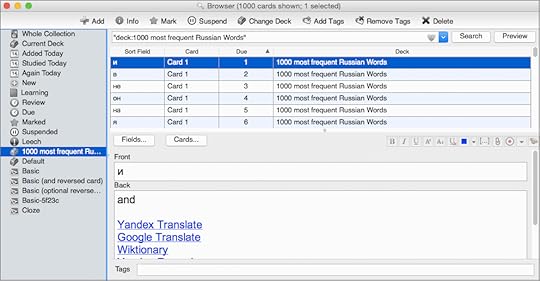
Click on due to sort the cards by that column (frequency order).
Click on any card on the Grid (the card up to which you are more or less familiar).
Press fn + left arrow to select all the previous cards (the familiar words).
Click Delete on the top right of the window.
After doing all the above you can start reviewing words with a frequency index greater than the one you wish. That’s all! You can now get cracking!
Last but not least, I want to bring to your attention the following points:
The above method should never be your principal method of learning vocabulary. It should be a complementary method which helps you catch important-frequent words that just slip through your day-to-day vocabulary net. If you want to explore effective language techniques for the Russian language, you can read the relevant section of my blog here. I have also written a book on how to learn Russian with all the necessary methods and material you need to learn Russian effectively without a teacher.
The default word definitions come from Yandex Translate website. They are not always the best because you can never get the best translation with any tool. Always, consult the links provided to find examples and more information about every word before you move to the next.
The list of the words has been compiled using this reliable resource here.
If you liked this post, don’t forget to share and leave a comment below to let me know about your progress and ideas! Enjoy!
The post Most common Russian Words with Anki appeared first on Live Diversified.
September 6, 2015
Mnemonics and their limitations in studying vocabulary
The keyword mnemonics technique uses keywords and mental images to associate verbal material. For example, let’s say you want to memorize the French feminine noun affiche that means poster in English. For this, you could imagine a feminine looking fish attaching a poster to the wall.
This technique has become increasingly popular lately. It is also the core learning strategy of Memrise, an online language learning platform. Memrise was founded by the memory champion and author Ed Cooke.
I hadn’t practised this technique until I came across Memrise. I started fanatically creating mental images and keywords to memorize words in Russian. I realized that not every word is easy to tackle with mnemonics. However, I managed to use my imagination and come up with some surreal mental images that helped me to memorize a few Russian words. I got really excited! “This technique is gold”, I thought!
However, we have to be careful with how we arrive to “cause-and-effect” conclusions. Do I successfully remember these words because of the mnemonics per se, or because of the repetition of the retrieval process? In fact, I was over excited to confirm that this method works, so I kept going back to recall the mnemonics from my memory (retrieval process or self-testing). In that case, maybe it was the repeated retrieval process that helped me to memorize the targeted words.
For this reason, I decided to dig deeper into research. I found that lots of studies show a benefit of the mnemonics in the short-term, i.e. when someone is tested soon after a study session. However, when targeted words are not keyword-friendly, or someone receives delayed tests on them, the benefits vanish.
Hall (1988) conducted several experiments and showed that a control group outperformed the mnemonics group on English words that were not keyword friendly. Even when the mnemonics group was given the keywords, i.e. they didn’t have to waste time generating them, the control group performed better.
Condus, Marshall, Miller, Raugh & Atkinson (1975) investigating the long-term benefits of the mnemonics, they included a test soon after the practice and one after a longer delay of several days, or even months. These studies showed a benefit of the mnemonics method for both the immediate and delayed tests.
However, the promising results of the later research were compromised by the design of the experiments as the exact same groups were tested both on the immediate and the delayed tests. Given that the mnemonics group showed increased performance on the immediate test, this initial successful recall could have boosted the performance on the delayed test. In other words, the advantage in the delayed test performance for the mnemonics group could have been due to the retrieval practice (immediate test) and not due to the mnemonics per se (It is known that retrieval practice slows forgetting.)
For this reason, researchers tested different groups on the immediate and delayed tests. The results below show that although the mnemonics group outperformed a rote repetition (repeated study) group on the immediate test, the benefits on the delayed test vanished for those who received only the delayed test.
In a second experiment, after researchers nearly equated the performance of the two groups on the immediate test by giving more training to the rote repetition group, the repetition group performed much better than the mnemonics group on the delayed test as shown on the chart below:
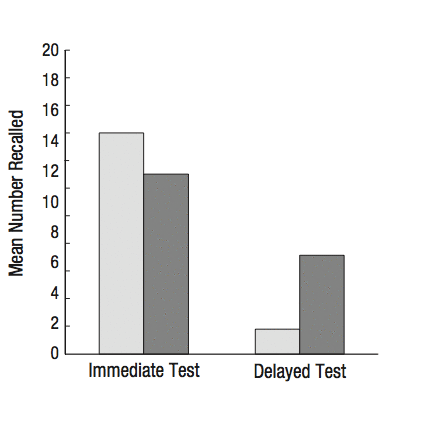 This shows that the mnemonics are not as effective for long-term retention. This is probably because it gets harder to decode the mnemonic if lots of forgetting has occurred . For example, for the feminine looking fish we have lots of target words, “fish”, “poster”, “wall”, “feminine” etc. Which of these words corresponds to what?
This shows that the mnemonics are not as effective for long-term retention. This is probably because it gets harder to decode the mnemonic if lots of forgetting has occurred . For example, for the feminine looking fish we have lots of target words, “fish”, “poster”, “wall”, “feminine” etc. Which of these words corresponds to what?
Apart from the long-term retention disadvantage of the mnemonics, their critics also report the following:
Time is needed to train someone to generate appropriate mnemonics.
Time is needed to generate keywords and mental images.
There is no evidence that mnemonics are superior to traditional self-testing or repetition of study.
Mnemonics are limited in terms of learning domain to foreign languages. Even within that domain, not all the material is keyword friendly, i.e. it is not always easy to create keywords.
Going back to Memrise, Ed Cooke and his team, apart from mnemonics, rely heavily on repeated retrieval practice using sophisticated algorithms. So, their system throws you a certain word several times spaced with intervals that are optimized for effective learning.
As a conclusion, you should use mnemonics for keyword-friendly words when you learn a foreign language but make sure you refresh them frequently in your memory. In general, testing and spaced practice are proven methods that promote effective, long-term and durable learning. Stay tuned, I will soon come back with more interesting results…
The post Mnemonics and their limitations in studying vocabulary appeared first on Live Diversified.
August 13, 2015
We have 3 winners!
Hello lovely diversified people,
We have 3 winners from the last italki prize competition:
1) Daniel Smith
2) Emmanuel Tartagal
3) Sarah Kim
The guys above each wins $40 to spend on italki private language lessons! I would like to thank you all for your participation and very useful intelligence you gave to me regarding your difficulties learning a language and your needs! I promise to do my best to help!
Subscribe here as more prizes are to come!
Thanks again,
Angelos
The post We have 3 winners! appeared first on Live Diversified.
July 24, 2015
Win private language lessons!
Hi all!
I am working on some big plans to create the best methods and resources for language learners, and I need your help.
I would like you to answer just 3 questions as much in detail as possible! It would be a massive help and there is something in it for you – scroll below:
1) What is your favourite website or software which helps you learn a language and why?
2) What is your favourite method for memorising new words?
3) What is your biggest difficulty in learning a language?
What’s in it for you??? I thought you’d never ask!
I am going to give away three iTalki promo codes, each one worth 400 points ($40), to three lucky participants. Italki helped me to practise my Russian with native speakers at very affordable prices. To learn more about iTalki please read my article here. In addition, everyone who takes part will be the first to get access to my upcoming ebook ‘Learn Russian the smart way’, for FREE.
Please send the answers to: livediversified@gmail.com until the 7th of August 2015!
Thank you,
Angelos
The post Win private language lessons! appeared first on Live Diversified.
July 3, 2015
Visualisation and language learning
Visualisation is the process of creating mental images with a certain purpose. Top performers know very well the importance of picturing themselves succeeding in their minds before they do in reality. Michael Jordan always used to take a last shot in his mind before he took one in real life. Muhammad Ali always visualised knocking out his opponent well before entering the ring. Researchers in the Cleveland Clinic Foundation compared people who trained to build their muscles to those who just visualised themselves training. The ones who trained in reality increased their muscle strength by 30%. However, the ones who just performed mental workouts increased muscle strength by almost half as much (13.5% – see scientific paper here).
Visualisation can be applied to language learning too with astonishing results. Jane Arnold, a professor of language teaching methodology at University of Seville, has extensively written about this (see sample pages of her book here). She recalls that her interest in visualisation was prompted by an American Scholar who saved hours of studying by visualising himself speaking fluently in Italian and French before travelling to Europe for summer conferences.
Let’s now look at an example of how you can add visualisation to your Russian language learning. Suppose you have just learned a new word – замечательная: wonderful. Now close your eyes and imagine a real-life dialog between you and another Russian speaker in which you use this new word. One example follows below between you and Olya:
Olya: Привет! – Hi!
You: Привет! Как дела? – Hi! How are you?
Olya: Хорошо, спасибо! – Good, thanks!
You: Ты не работаешь сегодня? – Are you not working today?
Olya: Нет! Я отдыхаю сегодня! – No! I am resting today!
You: Как здорово! Пойдем в кино? – How nice! Shall we go to the cinema?
Olya: Да, это замечательная идея! – Yes, this is a wonderful idea!
Visualisation is effective as it forces you to pay attention. Ed Cooke, a memory champion, says that attention is the single most important thing in memorisation. In the above example, you need to focus to synthesise all the information, the dialog, the environment, the actors.
When you visualise you should involve all your senses. Maybe a mental image is more closely related to the sense of sight. However, next time you stumble over the words ‘хлеб’ (bread) or ‘скрипка’ (violin), you will see that you can easily visualise the nice smell of freshly baked bread or the beautiful sound of violin. Also, feel free to exaggerate with your imagination; think of unusual images which will make your visualisations and memories last longer.
Visualisation can be even more powerful when it engages you emotionally. In our example above, you are covered with joy as Olya accepts to go to the cinema with you. Visualise yourself speaking fluently in Russian and being confident. That will certainly take you a step closer to the goal.
Finally, it is well known that we learn better in a state of calmness. When we visualise, we are in a state of alertness and calmness; this is exactly the state in which we achieve optimal results in learning. Finally, I just wanted to mention how we say visualisation in Russian in case your Russian friends ask you how you learned the language so quickly. It is an easy one, give it a guess! Визуализация!
PS: Please note also that in the above dialogue, a more natural response from Olya or a native speaker, would be something like: Да… конечно… почему нет? (Yes, sure, why not?) or, Да… конечно… пойдем! (Yes, sure, let’s go!) or, Конечно… да… давай! (Sure, yes, come on). Special thanks to Mikhail Katykhov (Adjunct Professor of Business at Lakeland College Japan) and Славик (see comment below) for this nice piece of feedback.
The post Visualisation and language learning appeared first on Live Diversified.


